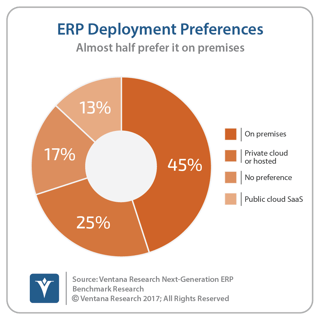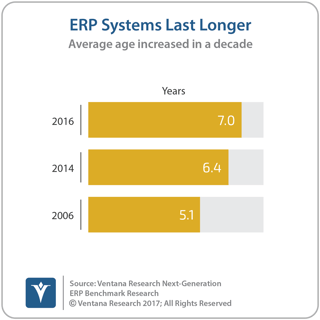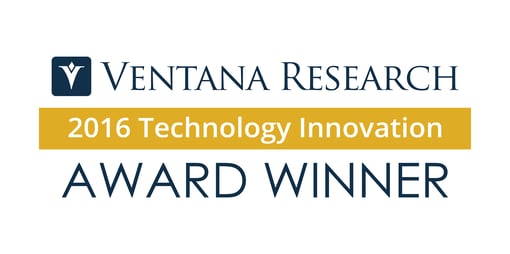Oracle recently held its second ERP Cloud Summit with industry analysts. The all-day event wasn’t just about ERP. The company covered a range of its business applications, including financial performance management as well as its Adaptive Intelligent Applications. And it wasn’t just about the cloud. After more than a decade of steady developments, ERP systems have begun to change fundamentally, facilitated by the growing availability of new technologies including cloud computing, advanced database architecture, collaboration, user interface design, mobility, analytics and planning. Here are my key takeaways from the event:
- After nearly a decade of work, Oracle now offers a broad portfolio of cloud-based business applications that evolved from its on-premises offerings.
- As is the case with most vendors, Oracle will need to continue to add functionality and capabilities to its cloud offerings to expand its addressable market. The inability of users to customize multi-tenant software and the need to expand the configurability of them is a challenge facing ERP cloud vendors.
- Oracle’s existing offerings and technology roadmap reflect the ongoing evolution to the next generation of ERP software, which supports digital process reengineering, as I have written.
At the summit, Oracle emphasized the depth and breadth of its complementary business applications in the cloud, not just ERP. In addition of Financials and HR, the company offers applications for procurement, supply chain and project portfolio management, which includes functionality essential to professional services organizations. Oracle was early to the market with revenue management software to address the new revenue recognition accounting requirements. There’s also Enterprise Performance Management, which includes planning, budgeting, consolidation and reporting which we refer to as financial performance management in our research. Furthermore, Oracle recently introduced cloud-based profitability and cost management as well as tax reporting. A multitenant consolidation offering will be available later this calendar year. Its broad portfolio of applications gives Oracle an advantage in the market as it will appeal to buyers who prefer dealing with a single vendor. This advantage is likely to increase as the configurability, features and functions of its multitenant cloud applications expand.
Cloud ERP is increasingly important to Oracle’s business. As a result of the recent NetSuite acquisition, on which I commented, ERP is now the company’s largest source of applications revenue. NetSuite will be handled as a separate line of business with a distinct sales channel based on the size of the company. Some channel conflict is inevitable. Managing it effectively to minimize its impact shouldn’t be too difficult.
Oracle is showing momentum in cloud ERP. In the company’s recently announced third fiscal quarter report, it stated that it added 564 new ERP customers (this number excludes NetSuite), half of whom hadn’t been using an Oracle ERP system. Another 120 existing customers expanded their deployment in some fashion. On the quarterly earnings call, the company said it had 3,700 ERP customers as of the end of the quarter, of which 1,465 are live. The reported numbers show rapid growth in all cloud offerings while sales in on-premises licensed software are largely flat.
Oracle will continue to invest in extending the capabilities and configurability of its cloud offerings. To date, cloud vendors have found customers that are able to align most of their business processes and reporting requirements to their SaaS offerings, especially in services businesses.
Yet while percentage increases reported by  cloud vendors are impressive, it’s off a small base. Many companies still prefer an on-premises implementation for their ERP system. Our next-generation ERP benchmark research shows that 45 percent of companies still prefer on-premises deployment of ERP software and another 25 percent prefer a private cloud or a hosted application, compared to 13 percent that opt for a multitenant cloud approach and 17 percent that expressed no preference.
cloud vendors are impressive, it’s off a small base. Many companies still prefer an on-premises implementation for their ERP system. Our next-generation ERP benchmark research shows that 45 percent of companies still prefer on-premises deployment of ERP software and another 25 percent prefer a private cloud or a hosted application, compared to 13 percent that opt for a multitenant cloud approach and 17 percent that expressed no preference.
The main reason people prefer on-premises deployment stems from a concern that cloud deployment is less secure. However, this issue was voiced by a minority (41%) of the participants in our research and has been declining. Oracle has sought to allay security concerns by building multiple layers of security into its cloud-based products. Suitability for particular use is also a factor in deciding how to deploy software. In our research 27 percent of companies said their current ERP system required substantial customization and another 45 percent said it required some. Companies that expect their specific requirements to require customization might be less inclined to consider a multitenant SaaS offering though Oracle has addressed many of these concerns.
 It’s also possible that companies are waiting for cloud offerings to mature further and meet their specific requirements without customization before moving from their existing systems. Our research finds that, on average, the useful life of an ERP system is 7.0 years, compared to 6.4 years when we measured this in 2014 and 5.8 years a decade ago. I’ve heard from companies that they aren’t opposed to a multitenant cloud but they doubt that they can have the functionality and process flexibility they need for their business. The slower replacement cycle is an advantage to incumbent vendors, which continue to collect maintenance fees from customers.
It’s also possible that companies are waiting for cloud offerings to mature further and meet their specific requirements without customization before moving from their existing systems. Our research finds that, on average, the useful life of an ERP system is 7.0 years, compared to 6.4 years when we measured this in 2014 and 5.8 years a decade ago. I’ve heard from companies that they aren’t opposed to a multitenant cloud but they doubt that they can have the functionality and process flexibility they need for their business. The slower replacement cycle is an advantage to incumbent vendors, which continue to collect maintenance fees from customers.
One advantage that Oracle has been emphasizing is its ability to deliver highly capable Platform-as-a-Service (PaaS) capabilities that enable companies to create custom application extensions on the same platform as the core ERP system. PaaS has the potential to address the specific requirements of a company that might otherwise prevent it from adopting a cloud-based application. Yet, spokespeople told us analysts that the company tries to discourage the creation of such extensions except when absolutely necessary. This is a rational policy. Custom software must be maintained and has the potential to create issues when the core multitenant software is updated, despite creating an environment that attempts to minimize incidents where upgrades will break PaaS applications. Over time the proliferation of custom code can become a mare’s nest of complexity, which can degrade the customer experience. If past behavior is any guide, even after the software vendor has added code that addresses the company’s needs, the custom code will remain, adding unnecessary complications.
Oracle’s Adaptive Intelligent Apps approach is consistent with a notable feature of the next generation of ERP applications: their ability to support digital process reengineering. Ventana Research coined this term to describe the full scope of forces driving digital disruption. All business processes fit within the “sense, analyze, decide, act” framework. Technologies such as the Internet of Things, on which we have released new research, blockchain digital ledgers, which I have written about, and social media fall into the “sense” phase of systems. These, as well the vast amounts of internal and external data available to companies, can be harnessed to make new products, services and business models feasible. In Oracle’s case, Adaptive Intelligent Apps are designed to provide a range of easily consumed data that can be used in ERP as well as for supply chain, HR and customer applications. Oracle Adaptive Intelligent Apps received the 2016 Technology Innovation Award in Business Technology Innovation. Oracle is also providing its customers with tools for big data analytics and scalable infrastructure to analyze data torrents. Due to the incessant flow of data, artificial intelligence, decision science and machine learning increasingly will be necessary to enable executives and managers to be nimbler in deciding their best course of action. Collectively they can eliminate the need for individuals to be involved in straightforward decision-making and permit individuals to focus on more important issues.
Oracle Adaptive Intelligent Apps received the 2016 Technology Innovation Award in Business Technology Innovation. Oracle is also providing its customers with tools for big data analytics and scalable infrastructure to analyze data torrents. Due to the incessant flow of data, artificial intelligence, decision science and machine learning increasingly will be necessary to enable executives and managers to be nimbler in deciding their best course of action. Collectively they can eliminate the need for individuals to be involved in straightforward decision-making and permit individuals to focus on more important issues.
The distinction between the ERP offerings of cloud-first vendors and the multitenant offerings from on-premises ERP vendors will wane in coming years. Buyers focus mainly on what the software will do for their business and aren’t necessarily swayed by technology culture wars. Our research shows that usability (the ability of software to meet business needs) and functionality (the specific capabilities of the software for business purposes) are the two factors most often cited by buyers of ERP software as very important (77% and 63%, respectively) to their evaluation of software. Demand for multitenant cloud ERP will grow as offerings meet these requirements for a larger set of organizations, especially those engaged in manufacturing and product-centric businesses. Vendors that can provide ERP systems that work for the widest possible audience will lead the market. Multitenant cloud ERP systems can have a lower cost of ownership, provide better performance and enable IT organizations to focus on more strategically important requirements. We advise organizations that are reluctant to consider multitenant ERP to keep an open mind. Offerings like Oracle ERP Cloud are evolving rapidly, so they should periodically assess the suitability of cloud ERP for their needs.
Regards,
Robert Kugel
Senior Vice President Research
Follow me on Twitter @rdkugelVR
and connect with me on LinkedIn.




 Oracle Adaptive Intelligent Apps received the 2016 Technology Innovation Award in Business Technology Innovation. Oracle is also providing its customers with tools for big data analytics and scalable infrastructure to analyze data torrents. Due to the incessant flow of data, artificial intelligence, decision science and machine learning increasingly will be necessary to enable executives and managers to be nimbler in deciding their best course of action. Collectively they can eliminate the need for individuals to be involved in straightforward decision-making and permit individuals to focus on more important issues.
Oracle Adaptive Intelligent Apps received the 2016 Technology Innovation Award in Business Technology Innovation. Oracle is also providing its customers with tools for big data analytics and scalable infrastructure to analyze data torrents. Due to the incessant flow of data, artificial intelligence, decision science and machine learning increasingly will be necessary to enable executives and managers to be nimbler in deciding their best course of action. Collectively they can eliminate the need for individuals to be involved in straightforward decision-making and permit individuals to focus on more important issues.








